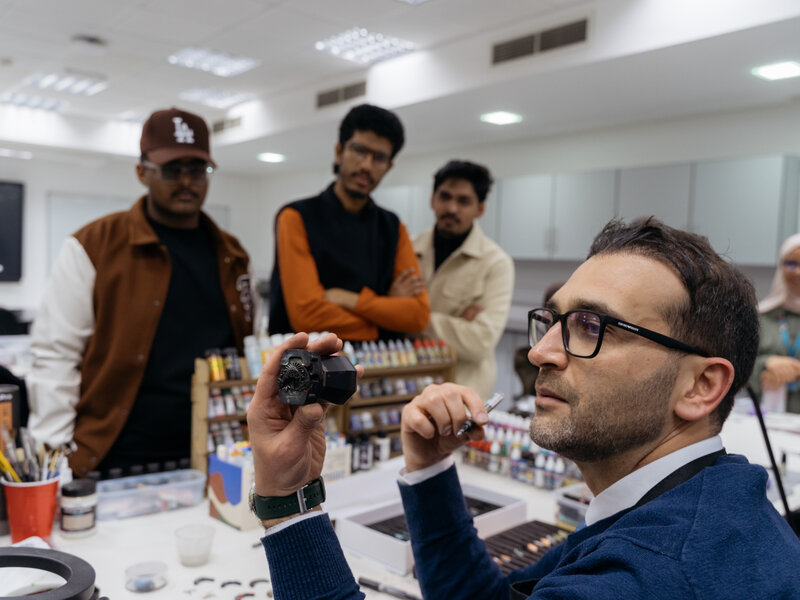In a move blending centuries-old Swiss expertise with Middle Eastern ambition, Bahrain has opened its first dedicated watchmaking school. The goal? To build a new generation of skilled artisans, bring back the appreciation of craftsmanship, and create a new industry niche in the Gulf region.
Set in the capital city of Manama, the watchmaking school is the result of an exciting partnership between the Bahrain Institute for Pearls and Gemstones (known as DANAT) and the prestigious Swiss training body, the Fondation de la Haute Horlogerie (FHH). This initiative is a bold step for Bahrain, a small island nation with a big vision for economic diversification and cultural renewal.
From Pearls to Precision
Bahrain has a deep-rooted history in luxury—especially through its once-thriving pearl industry. The country was globally known for producing some of the finest natural pearls. Now, Bahrain hopes to build a new legacy, not underwater, but under a microscope—with tools, gears, and movements that mark the art of fine watchmaking.
Students at the new school are taught the delicate science of horology—the design and assembly of timepieces—using Swiss methodology and tools. Courses cover mechanical watch movements, components, finishing, and even micro-engineering. The teaching standard mirrors that of Switzerland’s top horological institutions.

The first batch of students includes young Bahrainis, some of whom had never seen the inside of a luxury watch before. Yet they are now learning how to dismantle, clean, and rebuild mechanisms with hundreds of parts—each no bigger than a grain of rice. Every student wears a white lab coat and carries a magnifying loupe, essential for the intricate work that defines high-end timekeeping.
Teaching More Than Just Time
This school isn’t just about building a watch. It’s about building a mindset—one of patience, focus, and craftsmanship in a fast-moving world.
Bahrain’s watchmaking program is designed to meet international certification standards. Graduates will walk away not just with technical skill, but with credibility that opens doors to jobs across the luxury watch industry—from Switzerland to Dubai and beyond. Some may even start their own independent watchmaking brands, giving rise to a unique Bahraini identity in global horology.
For a country seeking to reduce its reliance on oil and banking, watchmaking represents a niche but high-value sector. Unlike many other trades, fine watchmaking isn’t easily automated. It requires human touch, discipline, and artistry—all of which Bahrain aims to cultivate through this initiative.
A Rare Opportunity in the Middle East
Watchmaking schools are rare even in Europe. In the Middle East, they’re practically unheard of—until now. Bahrain’s new school is the first of its kind in the Gulf region.
Students like Fatima Al-Doseri, one of the program’s few female participants, see this as an exciting and empowering opportunity. “It’s delicate work, but I love it. You need to focus. You can’t rush. You have to respect the watch,” she said.
The presence of women in a field historically dominated by men also signals social progress in the region. The program is open to both genders, and the school hopes to become a center for inclusion and innovation.
Swiss Support and Global Vision
To ensure top-tier training, Swiss professionals from major watch brands and academies are involved in developing the curriculum. They also train the instructors, supply the specialized tools, and monitor the quality of education.
For Switzerland—home of legendary brands like Rolex, Patek Philippe, and Omega—this partnership is a way to expand horology’s reach and influence beyond Europe. For Bahrain, it’s a chance to elevate its standing as a center for luxury craftsmanship, a reputation once earned through pearls and now being revived with watches.
The goal is not just to teach how to repair watches, but to potentially design new ones. Over time, the program hopes to spark creativity and entrepreneurship among students who may develop their own watch models and brands.
Long-Term Goals: From Classroom to Workshop
Once trained, graduates could find themselves working in service centers for major watch brands, in independent repair shops, or even in high-end retail boutiques that require in-house experts. Bahrain could also become a regional hub for watch repair and maintenance—a much-needed service in the Gulf, where many luxury timepieces are shipped abroad for servicing.
By developing local expertise, Bahrain reduces dependency on foreign technicians and creates new job opportunities in the luxury sector. It’s a win-win for both culture and commerce.
Supporting Economic Diversification
This initiative fits neatly into Bahrain’s long-term economic plans, which include building a knowledge-based economy. As part of the country’s Vision 2030 strategy, Bahrain aims to create sustainable industries that are future-proof, human-centered, and globally connected.
Watchmaking checks all those boxes. It requires deep skill, rewards creativity, and supports luxury branding—an area the Gulf states are increasingly investing in.
Looking Ahead
The success of Bahrain’s watchmaking school could inspire similar programs across the Middle East. As the first cohort of students progresses, there’s already talk of expanding the curriculum, partnering with additional luxury brands, and even creating a homegrown Bahraini watch brand in the future.
For now, the focus remains on quality over quantity. Students are expected to master the art slowly and carefully. As one Swiss instructor put it, “In watchmaking, precision is everything. You can’t cut corners—not even by a second.”
Bahrain’s move to bring Swiss horology to the Gulf isn’t just about making watches. It’s about making time for craft, for care, and for a future that honors both tradition and innovation.
Syria’s New Leader Meets Bahraini Foreign Minister in Damascus



